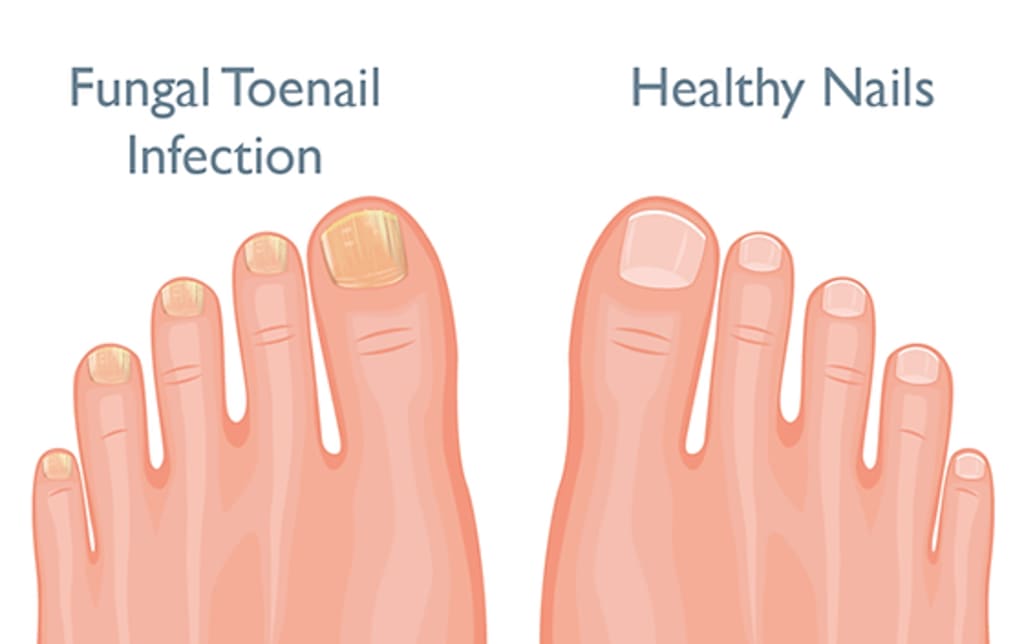Fungal Nail Infections
Highly prevailing in middle to old-age

Fungal nail infections are highly prevailing in middle to old-age people and are often seen in people with low immunity
Fungal nail infections are a common type of infection that can affect the nails on your fingers and toes. They are caused by a group of fungi called dermatophytes, which can thrive in warm, moist environments. Anyone can get a fungal nail infection, but certain factors can increase your risk. Treatment options include over-the-counter antifungal medications, prescription oral or topical medications, or a combination of both. Preventative measures include keeping your nails clean and dry, wearing socks that wick away moisture, and avoiding walking barefoot in public areas. Fungal nail infections can recur even after treatment, so it's important to continue preventative measures. While the nail polish is not recommended during treatment, some antifungal nail polishes are available. Exercise can still be done with a fungal nail infection, but precautions should be taken to prevent the spread of infection. If you suspect you have a fungal nail infection, it's important to seek treatment from a healthcare professional.
Introducing, the ultimate antifungal serum created by renowned physician and women's health expert, Dr. Kimberly Langdon. Packed with premium natural ingredients, this blend of oils and minerals is specially formulated to promote healthy nails and skin, while combating fungal infections.
This potent formula includes a carefully selected blend of natural oils such as Lavender, Tea Tree, Clove Bud, Manuka, Flaxseed, and Almond, all of which have proven antifungal properties. Vitamin E, Aloe Vera, and other essential minerals further enrich this powerful serum, delivering a multitude of benefits to your nails and skin.
Whether you suffer from nail fungus, athlete's foot, or other fungal infections, this serum is your go-to solution. Its natural ingredients work together to soothe and moisturize your skin while fighting off harmful bacteria and fungi. Plus, its non-greasy, fast-absorbing formula means you can apply it anytime, anywhere.
It is also a must-have for those who want to keep their nails and skin healthy and beautiful. Its nourishing ingredients help to strengthen and protect your nails while improving skin texture and tone. Say goodbye to dry, brittle nails and hello to radiant, healthy-looking skin.
So why settle for mediocre when you can have the best? Try this serum today and experience the difference for yourself. This unique, antifungal serum is made from the finest natural ingredients and is sure to become a staple in your daily routine. Don't let fungal infections take control of your nails and skin any longer – trust this serum to keep them healthy, strong, and beautiful.
FAQs
Q. What are fungal nail infections?
A. Fungal nail infections, also known as onychomycosis, are a common type of infection that can affect the nails on your fingers and toes. They occur when a fungus infects the nail bed or plate, causing the nail to become thick, discolored, and brittle.
Q. What causes fungal nail infections?
A. Fungal nail infections are usually caused by a group of fungi called dermatophytes. These fungi thrive in warm, moist environments like public showers, locker rooms, and swimming pools. They can also be spread from person to person through direct contact.
Q. Who is at risk of getting a fungal nail infection?
A. Anyone can get a fungal nail infection, but certain factors can increase your risk. These include having a weakened immune system, having diabetes, wearing tight-fitting shoes or socks, and walking barefoot in public areas.
Q. How are fungal nail infections diagnosed?
A. To diagnose a fungal nail infection, your doctor may scrape the affected nail and examine it under a microscope or send it to a lab for testing. They may also ask about your symptoms and medical history.
Q. What are the treatment options for fungal nail infections?
A. Treatment for fungal nail infections may include over-the-counter antifungal medications, prescription oral or topical medications, or a combination of both. In some cases, your doctor may recommend removing the affected nail.
Q. Can fungal nail infections be prevented?
A. Yes, there are several steps you can take to prevent fungal nail infections. These include keeping your nails clean and dry, wearing socks that wick away moisture, wearing shoes that fit well, and avoiding walking barefoot in public areas. You should also avoid sharing nail clippers or other personal grooming tools with others.
Q. How long does it take to treat a fungal nail infection?
A. Treatment for fungal nail infections can take several months, and it may take up to a year for the nail to fully heal. It's important to continue treatment as directed by your doctor even if the nail appears to have improved, as the infection may still be present.
Q. Are fungal nail infections contagious?
A. Yes, fungal nail infections can be contagious and can spread from person to person. It's important to take steps to prevent the spread of infection, such as avoiding sharing personal grooming tools and wearing shoes in public areas.
Q. Can home remedies be effective in treating fungal nail infections?
A. While some home remedies may have anecdotal evidence of effectiveness, there is limited scientific evidence to support their use. It's important to consult with your doctor before trying any home remedies, as they may interfere with prescribed treatments.
Q. Can nail polish be used with fungal nail infections?
A. While nail polish is not recommended during treatment for fungal nail infections, some antifungal nail polishes are available. Your doctor can advise you on the best course of treatment for your specific case.
Q. Can fungal nail infections lead to other health problems?
A. In some cases, untreated fungal nail infections can lead to other health problems such as cellulitis, a skin infection, or an infection in the bone underneath the nail. It's important to seek treatment if you suspect you have a fungal nail infection.
Q. Can fungal nail infections recur?
A. Yes, fungal nail infections can recur even after treatment. To reduce the risk of recurrence, it's important to follow preventative measures such as keeping your nails clean and dry and avoiding walking barefoot in public areas.
Q. Can I still exercise with a fungal nail infection?
A. Yes, you can still exercise with a fungal nail infection, but it's important to take steps to prevent the spread of infection. This includes wearing shoes in public areas and keeping your nails clean and dry. If you experience pain or discomfort during exercise, it's important to consult with your doctor.
About the Creator
MANOJ KUMAR
Never Stop Dreaming: A true inspiration for anyone looking to turn their dreams into reality. From a humble background to a millionaire, my journey is a testament to the power of hard work, dedication, and an unbreakable spirit






Comments
There are no comments for this story
Be the first to respond and start the conversation.